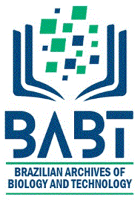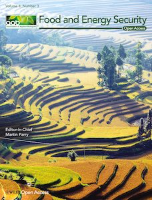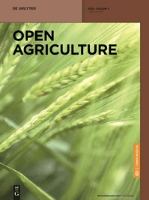
BRAZILIAN ARCHIVES OF BIOLOGY AND TECHNOLOGY
Scope & Guideline
Advancing multidisciplinary research in biology and technology.
Introduction
Aims and Scopes
- Biological Research:
The journal publishes original research in various fields of biology including microbiology, botany, zoology, and ecology, focusing on the biological processes and interactions within ecosystems. - Applied Biotechnology:
Research that explores the application of biological systems or organisms for technological advancements, including agricultural biotechnology, medical biotechnology, and environmental biotechnology. - Environmental and Agricultural Sciences:
Studies addressing environmental issues and agricultural practices, such as sustainable farming techniques, bioremediation, and the impact of climate change on biodiversity. - Computational and Data Science:
Papers that utilize computational models and data analysis techniques to solve biological problems, including bioinformatics, machine learning applications in biology, and systems biology. - Health and Pharmacology:
Research related to the health sciences, including studies on medicinal plants, pharmacological effects of substances, and the development of new therapeutic approaches. - Food Science and Technology:
Investigations into food production, safety, preservation, and the nutritional aspects of food, with an emphasis on innovative technologies in food processing.
Trending and Emerging
- Sustainable Biotechnology:
Research on sustainable practices in biotechnology is on the rise, focusing on eco-friendly technologies, waste reduction, and sustainable resource management. - Artificial Intelligence in Biology:
The integration of AI and machine learning techniques in biological research is increasingly popular, with studies employing these tools for data analysis, predictive modeling, and diagnostics. - Microbial Bioprospecting:
There is a growing interest in exploring microbes for novel bioactive compounds, particularly those with applications in medicine and agriculture. - Health and Wellness Innovations:
Research highlighting the relationship between diet, health, and innovative therapeutic strategies, particularly those involving natural products and functional foods, is trending. - Climate Change Impact Studies:
Papers examining the effects of climate change on biodiversity, ecosystem services, and agricultural practices are increasingly prevalent, addressing urgent global concerns. - Integrative Approaches to Food Science:
The trend towards interdisciplinary studies in food science, combining aspects of nutrition, technology, and environmental science, is gaining traction.
Declining or Waning
- Traditional Agricultural Practices:
Research focusing on conventional farming methods has decreased as interest grows in sustainable and innovative agricultural technologies. - Basic Microbial Studies:
There has been a noticeable decline in studies involving basic microbial characterization without applied context, as the field shifts towards applied microbiology and biotechnological applications. - Chemical Synthesis in Plant Studies:
Research centered solely on chemical synthesis and characterization of plant compounds is less common, as there is a growing emphasis on holistic studies that include ecological impacts and applications. - Conventional Breeding Techniques:
Papers focusing exclusively on traditional breeding methods in crops are waning as genetic engineering and biotechnological approaches gain prominence.
Similar Journals

Bioscience Journal
Advancing research for sustainable bioscience solutions.Bioscience Journal is a premier open-access publication dedicated to advancing research in the field of agricultural and biological sciences. Published by the Universidade Federal de Uberlândia, this journal has been a vital resource for the academic community since its transition to open access in 2001. With the ISSN 1981-3163, it serves as an essential platform for disseminating innovative research findings and methodologies that contribute to the sustainable development of biological resources. As of 2023, it has been categorized in the Q4 quartile in Agricultural and Biological Sciences (miscellaneous) and ranks 152 out of 221 in Scopus, placing it in the 31st percentile. The journal's scope encompasses a wide array of topics that stimulate interdisciplinary discourse and collaboration among researchers, professionals, and students alike. With engaging content and a commitment to accessibility, Bioscience Journal plays a crucial role in fostering scholarly communication and enriching the academic landscape in Brazil and beyond.

AIMS Agriculture and Food
Exploring the nexus of food science and agricultural research.AIMS Agriculture and Food is a leading open access journal published by the American Institute of Mathematical Sciences (AIMS), focused on the critical intersections of agricultural and food sciences. Since its inception in 2016, this journal has provided a vital platform for disseminating innovative research and advancements in the fields of agricultural and biological sciences and food science. With impressive Scopus rankings, including a Q2 categorization in 2023 for both Agricultural and Biological Sciences (miscellaneous) and Food Science, AIMS Agriculture and Food is recognized for its significant contributions to the academic community. The journal aims to foster interdisciplinary dialogue by welcoming submissions that tackle contemporary challenges, promote sustainable practices, and enhance food security. Researchers, professionals, and students will find this journal an invaluable resource, offering open access to high-quality, peer-reviewed articles that are essential for informed decision-making in agriculture and food industries.

TURKISH JOURNAL OF BIOLOGY
Empowering Researchers with Open Access to Cutting-edge ScienceTURKISH JOURNAL OF BIOLOGY, published by the Tubitak Scientific & Technological Research Council Turkey, is an esteemed peer-reviewed periodical that serves as a pivotal platform for advancing the fields of Agricultural and Biological Sciences. With a strong focus on innovative research across various biological domains, including Cell Biology, Genetics, and Microbiology, this journal not only fulfills the academic community's quest for high-quality research but also fosters collaboration and knowledge sharing among researchers. The journal's notable impact factors reflect its commitment to excellence, with its latest rankings placing it in Q2 in Agricultural and Biological Sciences (miscellaneous) and in Q4 for several other categories. By offering open access to its content, TURKISH JOURNAL OF BIOLOGY ensures that valuable biological insights are readily available to the global academic community. Its convergence from 2006 to 2024 signifies its longstanding influence in the biosciences, making it an essential resource for researchers, professionals, and students alike aiming to stay at the forefront of biological research and innovation.

SPANISH JOURNAL OF AGRICULTURAL RESEARCH
Nurturing Ideas for Enhanced Agricultural ProductivityThe Spanish Journal of Agricultural Research (ISSN: 1695-971X, E-ISSN: 2171-9292), published by the prestigious Consejo Superior Investigaciones Cientificas (CSIC), serves as a vital resource for those engaged in the fields of agronomy and crop science. Established as an Open Access journal since 2003, it aims to foster the dissemination of innovative research and practical applications related to agricultural practices and sustainability. With its Q3 category in Agronomy and Crop Science and a Scopus ranking of #224 out of 406, the journal provides an accessible platform for scholars to share valuable findings that enhance agricultural productivity and environmental stewardship. Covering research from 2006 to 2024, this journal continues to be instrumental for researchers, professionals, and students eager to remain at the forefront of agricultural science advancements.

Food and Energy Security
Unlocking New Pathways for Sustainable Food and Energy PracticesFood and Energy Security, an esteemed journal published by WILEY, is dedicated to advancing the fields of food science, agriculture, and renewable energy. Since its inception in 2012, this open-access journal has provided a platform for groundbreaking research and innovative practices that address global challenges related to food production and energy sustainability. With an impressive impact factor reflected in its Q1 quartile rankings across notable categories such as Agronomy and Crop Science and Food Science, this journal is instrumental for researchers and practitioners alike who are focused on enhancing food security and promoting sustainable energy solutions. The journal's scope encompasses multidisciplinary approaches and encourages submissions that explore the intersection of food systems and energy dynamics, ensuring relevance in the evolving landscape of environmental science and policy. By offering open access to its publications, Food and Energy Security commits to making vital research accessible, fostering informed dialogue and collaboration among scholars, policymakers, and the agrifood industry worldwide.

APPLIED MICROBIOLOGY AND BIOTECHNOLOGY
Pioneering research at the intersection of microbiology and innovation.Applied Microbiology and Biotechnology, an esteemed journal published by Springer, serves as a vital resource in the domains of microbiology and biotechnology. With an impressive impact factor reflecting its quality, the journal holds Q1 rankings in various categories including Applied Microbiology and Biotechnology, Biotechnology, and Medicine (Miscellaneous) as of 2023. Spanning the years from 1984 to 2024, it underscores its commitment to disseminating groundbreaking research that addresses pressing challenges in health, agriculture, and environmental sustainability. The journal is rigorously indexed and holds respectable positions in Scopus rankings, notably within the top 15% of Applied Microbiology and Biotechnology and the top 15% in Biochemistry, Genetics, and Molecular Biology. Although it is not Open Access, its comprehensive articles, reviews, and short communications are indispensable for researchers, professionals, and students eager to advance their understanding and application of microbial processes and biotechnological innovations in real-world contexts.

Nature Food
Driving Innovation in Food Science and Sustainability.Nature Food, an esteemed journal published by NATURE PORTFOLIO, stands at the forefront of research in Agronomy, Animal Science, and Food Science. With its E-ISSN 2662-1355 and a remarkable recognition of being ranked Q1 in three essential categories by Scopus in 2023, it is tailored for researchers, professionals, and students dedicated to the advancement of knowledge in these fields. Situated in the United Kingdom and extending its reach globally, the journal has displayed an impressive ranking, placing it in the top percentiles of Agricultural and Biological Sciences, highlighting its vital place in fostering innovative research and scholarly communication. The journal's scope encompasses a wide array of topics critical to food systems, sustainability, and agricultural practices, making it an invaluable resource for anyone looking to stay ahead in this dynamic area of study. With access options designed to enhance the visibility and dissemination of research findings, Nature Food is committed to promoting open dialogue and collaboration among the global academic community, driving forward our understanding of food security and environmental stewardship.

Journal of Agricultural Sciences-Tarim Bilimleri Dergisi
Fostering Dialogue for a Sustainable Agricultural FutureJournal of Agricultural Sciences - Tarim Bilimleri Dergisi, published by Ankara University, Faculty of Agriculture, is a prominent open-access journal that has been fostering academic dialogue in the field of agricultural studies since 2010. With ISSN 1300-7580 and E-ISSN 2148-9297, this journal contributes significantly to the scientific community, particularly within the realms of agronomy, crop science, animal science, and plant science. As of 2023, it holds a Q3 classification in Agronomy and Crop Science, and Q4 in both Animal Science and Zoology and Plant Science, indicating its growing influence and dedication to advancing research in these areas. Situated in Turkey, this journal serves as a vital platform for scholars, professionals, and students, inviting submissions that enhance our understanding of agricultural innovation and sustainability. With a commitment to disseminating high-quality research, Journal of Agricultural Sciences ranks favorably within Scopus, providing an invaluable resource for exploring evolving agricultural paradigms.

Open Agriculture
Connecting Researchers to Transform Agricultural PracticesOpen Agriculture, published by DE GRUYTER POLAND SP Z O O, is an innovative open-access journal dedicated to advancing research in the Agricultural and Biological Sciences. Since its inception in 2016, this journal has been committed to disseminating knowledge and facilitating collaboration among researchers, professionals, and enthusiasts in the agricultural sector. With an impressive Q2 ranking in the Agricultural and Biological Sciences category, it holds a prestigious position, ranking #65 out of 221 in its field, placing it in the 70th percentile. Open Agriculture offers a platform for high-quality research across a diverse range of topics, ensuring that crucial findings are readily accessible to the global scientific community. The journal continues to uphold its mission of promoting sustainable agricultural practices and innovations that address contemporary challenges in food security and environmental sustainability. With its strong commitment to open access principles, researchers and students alike can easily engage with cutting-edge research and contribute to the vibrant discourse surrounding modern agriculture.

BIOLOGICAL RESEARCH
Transforming research into accessible knowledge.BIOLOGICAL RESEARCH is a prestigious, peer-reviewed journal published by the Société de Biologie de Chile, dedicated to advancing the fields of Agricultural and Biological Sciences, Biochemistry, Genetics, and Molecular Biology, and Medicine. With an impressive ranking in the top quartile (Q1) in these categories as of 2023, this journal maintains high academic standards and visibility, making it a vital resource for researchers and professionals alike. Operating under an Open Access model since 2013, it ensures that research findings are freely accessible to a global audience, promoting the dissemination of knowledge and collaboration across disciplines. With a publication history dating back to 1992 and continued updates until 2024, BIOLOGICAL RESEARCH serves as a crucial platform for innovative research that impacts both scientific and healthcare communities. The journal’s commitment to quality and relevance is evidenced by its competitive performance in Scopus rankings, further solidifying its role as a leading journal within the biological sciences.